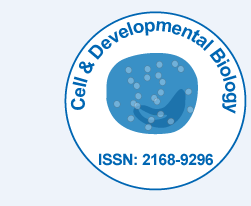
Cell & Developmental Biology
Open Access
ISSN: 2168-9296

ISSN: 2168-9296
Opinion Article - (2023)Volume 12, Issue 2
Mitochondria are often referred to as the powerhouse of our cells, and for good reason. These tiny organelles play a crucial role in producing the energy that our cells need to function properly. But the importance of mitochondria extends far beyond just providing energy. Recent research has shown that mitochondria also play a key role in many aspects of our health, from aging to disease.Mitochondria are found in almost every cell in our bodies, with the exception of red blood cells. They are small, bean-shaped organelles that contain their own DNA and are capable of reproducing themselves. The primary function of mitochondria is to produce Adenosine Triphosphate (ATP), which is the main source of energy for our cells. This process, known as cellular respiration, takes place in the mitochondria's inner membrane and involves a series of complex chemical reactions. While ATP production is perhaps the most wellknown function of mitochondria, recent research has revealed that these organelles also play a crucial role in many other aspects of our health. For example, studies have shown that dysfunctional mitochondria are associated with a number of diseases, including Alzheimer's, Parkinson's, and diabetes. In fact, some researchers believe that mitochondrial dysfunction may be at the root of many age-related diseases. One of the most interesting aspects of mitochondria is their relationship with aging. As we age, our cells accumulate damage from a variety of sources, including oxidative stress and DNA mutations. Over time, this damage can lead to dysfunction in the mitochondria, which in turn can lead to a decline in cellular energy production. This decline has been linked to many age-related diseases, including Alzheimer's and Parkinson's. Additionally, some researchers believe that mitochondrial dysfunction may play a role in the overall aging process.
Despite their small size, mitochondria are incredibly complex organelles. They contain their own DNA, which is separate from the DNA found in the nucleus of the cell. This DNA encodes for a number of proteins that are essential for mitochondrial function. However, mitochondrial DNA is more susceptible to mutations than nuclear DNA, which can lead to dysfunction in the mitochondria. This is one of the reasons why mitochondrial dysfunction is more common in older individuals, as accumulated damage can increase the likelihood of mutations.
Given the importance of mitochondria in so many aspects of our health, it's no surprise that researchers are constantly looking for ways to improve mitochondrial function. One promising approach is through the use of supplements that can support mitochondrial health. For example, compounds such as coenzyme Q10 (CoQ10) and Nicotinamide Adenine Dinucleotide (NAD+) have been shown to improve mitochondrial function and may have potential as anti-aging therapies.
Another area of research that has gained a lot of attention in recent years is the use of exercise as a way to improve mitochondrial health. Exercise has been shown to increase the number and function of mitochondria in cells, which can lead to improvements in energy production and overall health. Additionally, some research has suggested that exercise may even be able to reverse some of the effects of aging on mitochondria.
Mitochondria are truly remarkable organelles that play a crucial role in our overall health and well-being. While their primary function is to produce energy, recent research has revealed that they are also involved in many other aspects of our health, including aging and disease. As we continue to learn more about these tiny powerhouses, it's clear that they hold great promise for improving our health and extending our lifespans. Whether through the use of supplements or the power of exercise, there are many ways to support the health of our mitochondria and unlock their full potential.
Citation: Khader A (2023) Brief Note on The Role of Mitochondria in Health and Wellbeing. Cell Dev Biol. 12:272
Received: 01-Mar-2023, Manuscript No. CDB-23-22714 ; Editor assigned: 03-Mar-2023, Pre QC No. CDB-23-22714 (PQ); Reviewed: 17-Mar-2023, QC No. CDB-23-22714 ; Revised: 24-Mar-2023, Manuscript No. CDB-23-22714 (R); Published: 31-Mar-2023 , DOI: 10.35248/2168-9296.23.12.272
Copyright: © 2023 Khader A. This is an open-access article distributed under the terms of the Creative Commons Attribution License, which permits unrestricted use, distribution and reproduction in any medium, provided the original author and source are credited.
Competing interests: The authors have declared that no competing interests exist.